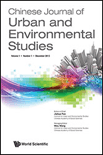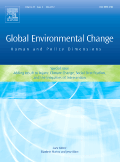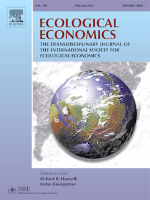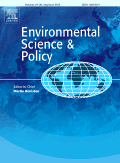
Journal of Integrative Environmental Sciences
Scope & Guideline
Empowering research at the intersection of environment and health.
Introduction
Aims and Scopes
- Interdisciplinary Research:
The journal emphasizes research that integrates multiple disciplines, such as ecology, economics, sociology, and policy studies, to tackle environmental issues holistically. - Sustainability and Development Goals:
A core area of focus is on sustainable development goals (SDGs), exploring how environmental sustainability can align with socio-economic development and policy frameworks. - Climate Change Adaptation and Mitigation:
Research frequently addresses climate change impacts, adaptation strategies, and mitigation measures, particularly in relation to socio-ecological systems and governance. - Socio-Ecological Interactions:
The journal investigates the complex interactions between social systems and ecological processes, emphasizing the importance of community engagement and social equity in environmental management. - Policy and Governance:
A significant focus is on policy implications of environmental research, providing insights into governance structures and frameworks that support sustainability initiatives.
Trending and Emerging
- Climate Change and Social Justice:
There is an increasing focus on the intersection of climate change and social justice, exploring how environmental policies can address inequalities and empower marginalized communities in adaptation strategies. - Integrative Sustainability Education:
Emerging concepts in sustainability education are gaining attention, emphasizing the need for innovative educational frameworks that prepare future leaders to address complex environmental challenges. - Water-Energy Nexus:
Research examining the interconnections between water resources and energy transitions is on the rise, particularly in the context of achieving carbon neutrality and sustainable development. - Digitalization and Environmental Management:
The role of digitalization in enhancing sustainable practices and environmental management is becoming a significant theme, with studies exploring how technology can drive transformative change in urban and agricultural contexts. - Migration as Adaptation Strategy:
The concept of migration as an adaptive response to environmental change is emerging, with research focusing on governance frameworks and the socio-economic implications of migration in the context of climate resilience.
Declining or Waning
- Traditional Environmental Impact Assessments:
There seems to be a waning interest in conventional environmental impact assessments, with fewer studies focusing solely on compliance and regulatory aspects, as the journal shifts towards more integrative and innovative approaches. - Single-Disciplinary Studies:
Research that is narrowly focused on a single discipline, such as pure ecology or traditional economics, is appearing less frequently, reflecting a broader trend towards interdisciplinary collaboration. - Static Models of Environmental Change:
Static modeling approaches that do not incorporate dynamic socio-economic factors or adaptive management strategies are becoming less common, as the journal prioritizes more responsive and adaptive frameworks. - Localized Case Studies without Broader Implications:
There is a decline in studies that only focus on localized environmental issues without connecting them to larger, global frameworks or implications, as the journal seeks to emphasize integrative and scalable solutions.
Similar Journals

Policy Design and Practice
Exploring new frontiers in policy design and implementation.Policy Design and Practice, published by Taylor & Francis Ltd, stands at the forefront of the fields of Political Science and Public Administration. Since its inception as an Open Access journal in 2018, it has played a pivotal role in disseminating cutting-edge research that informs effective policy-making and implementation. With a commendable impact factor reflected in its Q1 rankings for both Political Science and International Relations, and Public Administration in 2023, the journal is ranked among the top 1% of publications in these disciplines, with Scopus Ranks placing it 5th in Political Science and 9th in Public Administration. By offering unrestricted access to articles, Policy Design and Practice endeavors to bridge the gap between academic research and practical application, making it an invaluable resource for researchers, practitioners, and students alike. As it continues to grow alongside the evolving landscape of policy design, this journal remains a crucial platform for scholarly dialogue and innovation.

Chinese Journal of Urban and Environmental Studies
Fostering Interdisciplinary Solutions for Urban SustainabilityChinese Journal of Urban and Environmental Studies, published by World Scientific Publishing Co Pte Ltd, stands at the intersection of urban studies and environmental research, providing a critical platform for the dissemination of knowledge and innovative ideas in these increasingly vital fields. With an ISSN of 2345-7481 and E-ISSN 2345-752X, this open-access journal has been recognized for its significant contributions, achieving impressive quartile rankings, including Q2 in Urban Studies and Q2 in Geography, Planning and Development for 2023. As it converges from 2019 to 2024, the journal aims to foster interdisciplinary collaboration and to stimulate dialogue among researchers, professionals, and policymakers. With its focus on relevant socio-economic and environmental issues, Chinese Journal of Urban and Environmental Studies serves as an essential resource for anyone looking to gain insight into the complexities of urban environments and their ecological impacts, making it an indispensable addition to the libraries of those committed to sustainable development and urban planning.

GLOBAL ENVIRONMENTAL CHANGE-HUMAN AND POLICY DIMENSIONS
Bridging Research and Policy for a Greener FutureGLOBAL ENVIRONMENTAL CHANGE-HUMAN AND POLICY DIMENSIONS is a premier academic journal published by Elsevier Science Ltd, based in the United Kingdom. With a significant focus on the interplay between human activities and environmental change, this journal serves as a critical platform for researchers and policymakers alike. It boasts an impressive impact factor and ranks in the top quartile (Q1) across multiple categories, including Ecology, Geography, and Environmental Science, reflecting its high relevance and influence within the respective fields. The journal provides insightful analyses and empirical studies from 1990 to 2024, fostering a deeper understanding of the socio-political dimensions of global environmental issues. Although it does not offer open access options, readers can still access the journal through various university libraries and institutional subscriptions, ensuring wide dissemination of important research findings. With its dedication to promoting interdisciplinary dialogue and evidence-based policy development, GLOBAL ENVIRONMENTAL CHANGE remains an invaluable resource for academics, practitioners, and students committed to addressing pressing environmental challenges.

Regional Sustainability
Empowering communities through cutting-edge sustainability research.Regional Sustainability is a premier open access journal published by KEAI PUBLISHING LTD, devoted to the interdisciplinary exploration of sustainable practices within urban and regional contexts. Since its inception in 2020, this journal has quickly established itself as a leading platform for innovative research, currently holding a strong position in category quartiles, including Q1 rankings in Development and Geography, Planning and Development in 2023. With its broad scope encompassing essential themes in Renewable Energy and Urban Studies, Regional Sustainability provides valuable insights and advances knowledge critical for sustainable development, drawing contributions from scholars and practitioners worldwide. The journal’s impressive Scopus rankings underscore its significance with a percentile rank of 87th in both Urban Studies and Development, making it essential reading for researchers and policymakers alike. The journal is headquartered in Beijing, China, and is committed to disseminating high-quality research that addresses contemporary challenges in sustainability.

ECOLOGICAL ECONOMICS
Navigating the Complexities of Ecological and Economic Systems.ECOLOGICAL ECONOMICS, published by ELSEVIER, stands as a premier journal dedicated to the integration of ecological and economic thinking, exploring the complex interactions between human and natural systems. With an impactful history dating back to 1989, the journal has solidified its position in the academic community, evidenced by its classification in the top quartiles (Q1) of both Economics and Econometrics and Environmental Science categories for 2023. ECOLOGICAL ECONOMICS boasts impressive Scopus rankings, holding the 32nd position out of 716 in Economics and Econometrics and 19th among 233 in General Environmental Science, reflecting its substantial influence and reach. Although it does not currently offer open access options, the journal remains a vital resource for researchers, professionals, and students interested in sustainable development, environmental policy, and resource management. The ongoing convergence of various fields within ecological economics promises to yield valuable insights and foster interdisciplinary collaboration, making this journal an essential component of scholarly discourse.

Journal of Environmental Studies and Sciences
Championing rigorous research in environmental studies.Journal of Environmental Studies and Sciences, published by SPRINGER, serves as a pivotal platform for advancing the field of environmental science and related disciplines. With an ISSN of 2190-6483 and E-ISSN of 2190-6491, this esteemed journal has established itself as a reputable source of knowledge since its inception in 2011. Covering an expansive range of topics related to environmental studies, the journal has achieved a commendable position within the academic community, evidenced by its 2023 category quartiles, ranking in the Q2 tier for both Environmental Science (miscellaneous) and Geography, Planning and Development. The journal's Scopus rankings further highlight its impact within the fields of Geography, Planning and Development, and General Environmental Science, boasting a respectable percentile rank of 69th and 58th respectively. Although it does not currently offer Open Access, the Journal of Environmental Studies and Sciences remains an essential resource for researchers, professionals, and students aiming to explore critical environmental issues, engage with innovative research, and contribute to sustainable development practices. Its ongoing commitment to academic rigor ensures that it continues to play a vital role in shaping the discourse around environmental challenges and solutions.

Economics of Energy & Environmental Policy
Innovating Strategies for Energy Management and Environmental Sustainability.Economics of Energy & Environmental Policy is a prestigious journal published by the International Association for Energy Economics, focusing on the intersection of economic principles and energy/environmental policy. Since its inception in 2012, this journal has provided a critical platform for researchers, professionals, and students interested in the multifaceted impacts of energy economics on society and the environment. With an impressive performance reflected in its 2023 Scopus rankings—Q2 in key areas such as Economics and Econometrics, Energy, and Management, Monitoring, Policy and Law—this journal not only contributes to academic discourse but also informs policymaking and industry practices. Although published as a traditional journal, its contents are vital for addressing contemporary challenges in energy management and environmental sustainability. Located in Cleveland, Ohio, the journal is committed to fostering innovation in energy economics, enhancing our understanding of the socio-economic dimensions of energy use, and promoting effective environmental policymaking.

ENVIRONMENTAL SCIENCE & POLICY
Shaping sustainable policies through rigorous science.ENVIRONMENTAL SCIENCE & POLICY, a leading journal published by Elsevier, serves as a pivotal platform for research that intertwines environmental science with policy development. With an ISSN of 1462-9011 and an E-ISSN of 1873-6416, this journal contributions outrival many, reflected by its 2023 Scopus rankings placing it in the Q1 category in both Geography, Planning and Development (Rank #36/821, 95th percentile) and Environmental Science, Management, Monitoring, Policy and Law (Rank #38/399, 90th percentile). Covering a broad spectrum of topics, it addresses critical interdisciplinary issues from 1998 to the present, fostering dialogue among researchers, policymakers, and practitioners alike. Although it does not offer Open Access options, the journal's rigorous peer-review process ensures high-quality and impactful publications, vital for anyone invested in advancing knowledge and practice in environmental governance and sustainable policy frameworks.

Frontiers in Sustainable Cities
Transforming Urban Landscapes through Innovative ScholarshipFrontiers in Sustainable Cities, published by FRONTIERS MEDIA SA, is an esteemed academic journal dedicated to advancing the fields of Urban Studies, Renewable Energy, and Public Administration. With a commitment to open access since 2019, the journal facilitates the dissemination of high-quality research aimed at creating sustainable urban environments. Operating from Lausanne, Switzerland, this influential publication supports knowledge exchange among researchers, professionals, and students involved in the complex dynamics of urban sustainability. The journal has achieved notable recognition, reflected in its quartile rankings—Q1 in Urban Studies and Q2 in both Public Administration and Renewable Energy, Sustainability and the Environment—indicating its relevance and impact within the scholarly community. Researchers benefit from a broad reach through its open access policy, enhancing visibility and accessibility of important findings that contribute to the development of sustainable cities globally.

Mitigation and Adaptation Strategies for Global Change
Navigating Solutions for a Changing WorldMitigation and Adaptation Strategies for Global Change is a prestigious journal published by SPRINGER, focusing on the critical areas of ecology and global change. With an impressive impact factor that places it in the Q1 and Q2 quartiles in their respective categories, this journal serves as an essential platform for researchers, professionals, and students actively engaged in addressing the challenges posed by climate and environmental changes. Since its inception in 1996, the journal has evolved to cover a wide range of interdisciplinary topics, fostering a holistic understanding of mitigation strategies and adaptation practices worldwide. Located in the Netherlands, it benefits from a robust editorial board and significant contributions from leading experts in the field. Although it does not currently offer Open Access, the journal's rigorous peer-review process ensures that only high-quality research is disseminated, making it a valuable resource for anyone seeking to remain at the forefront of global change research.